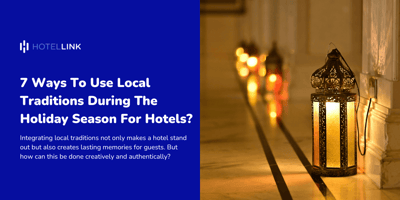As the festive season approaches, hotels worldwide become havens for travelers seeking...
How to Create Local Cultural Experiences to Attract Group Tours?
As global tourism continues to rebound, group travelers (MICE, incentive, corporate, or cultural tour groups) are increasingly seeking authentic, locally inspired experiences. A trip today is no longer just about sightseeing - it’s an opportunity to connect with the culture, people, and stories of a destination. That’s why integrating local cultural experiences has become a powerful strategy to attract international groups. It not only enhances a hotel’s brand value but also creates lasting memories for guests. Let’s explore how hotels can turn their local cultural identity into a sustainable competitive edge and capture the growing market of international group tours with Hotel Link.
Why International Groups Are Craving Local Cultural Experiences
In the past, international group travelers often prioritized convenience, comfort, and price. But today, the trend has shifted significantly. According to Booking.com and Expedia Group’s Global Travel Trends 2025 report, over 70% of international travelers - especially Millennials and Gen Z - prefer accommodations that reflect local culture rather than standardized hotels that look the same everywhere.
This shift is especially true for group travelers who travel to connect, learn, or host meaningful events. Imagine a Japanese incentive group attending a gala dinner in a beautifully local setting, complete with regional cuisine, music, and decor inspired by the destination they’re visiting - it’s far more memorable than a generic ballroom. In short, cultural immersion is the “soul” that helps hotels leave a deep impression on group guests.
Local Cultural Experiences – The “Differentiator” That Makes Hotels Stand Out

In an increasingly competitive market, where rooms, amenities, and locations are becoming more standardized, local culture is the secret ingredient that sets a property apart.
Two hotels may share the same star rating and price, but the one that artfully weaves local culture into its architecture, decor, and service will always stand out.
For example:
-
A hotel in Hoi An could host a Lantern-Making Experience exclusively for groups, blending light team-building with a personal touch - each guest crafting their own lantern to take home as a keepsake.
-
A resort in the Central Highlands might organize a Gong Music Night paired with a traditional Bana dinner, giving guests both entertainment and deeper cultural understanding.
These experiences not only make a trip more memorable but also strengthen the hotel’s image as authentic, community-driven, and sustainable.
Effective Ways to Integrate Local Culture into Group Experiences
1. Cultural Design & Ambience
Hotels don’t need to replicate traditional culture wholesale - subtle touches can go a long way. Use local materials, motifs, colors, or artwork to bring a sense of place. Examples include Bat Trang ceramics in the lobby, Dong Ho folk paintings in hallways, or handwoven bamboo lamps in restaurants.
For groups, these spaces also provide unique backdrops for photos, event recordings, or meetings - adding an extra layer of cultural richness.
2. Local Cuisine – The Universal Emotional Connector
Food speaks a universal language. Instead of offering generic international menus, hotels can feature regional specialties, share stories behind the dishes, or include live cooking shows.
A themed buffet like “Flavors of Vietnam” or “Coastal Cuisine of My Hometown” can become the highlight of a group stay. In fact, many hotels in Da Nang and Nha Trang have successfully increased MICE bookings by combining culinary showcases with interactive cooking workshops.
3. Interactive Experiences – Let Guests “Touch” the Culture
Even short, 1–2-hour cultural activities can make a huge impact:
-
Pottery, brocade weaving, or lacquer mini workshops.
-
Team-building games inspired by folk traditions (tug-of-war, bamboo dancing, rice-cake wrapping).
-
A short “Explore the Old Town Through the Lens” photo tour guided by local residents.
These moments allow guests not only to experience culture but to live it - while giving hotels authentic content for storytelling and digital marketing.
Read more: 7 Ways To Use Local Traditions During The Holiday Season For Hotels
Long-Term Business Benefits of Cultural Integration
1. Stronger Brand Value and Global Recognition
When group experiences are culturally distinctive, guests are more likely to share them on social media. A short video of travelers making lanterns or enjoying ethnic music can quickly spread, amplifying the hotel’s brand identity as distinctly “Vietnamese” and “refined.”
2. Higher Repeat and Referral Rates
TripAdvisor data shows that guests who engage in local cultural activities are 35% more likely to return or recommend the property. For them, the hotel becomes part of their story - not just a place to sleep.
3. Contribution to Sustainable Tourism
Partnering with artisans, local suppliers, and community groups to deliver cultural experiences generates mutual benefits: hotels boost revenue while supporting local economies and preserving heritage. Many global MICE organizations now prioritize sustainability and community engagement when choosing partners.
How to Implement Local Cultural Integration Effectively
1. Understand Your Target Group Segment
Different markets have different preferences. European groups may prefer traditional arts and history, while Asian groups tend to favor culinary or lifestyle experiences. Market insights are essential to tailor programs that truly resonate.
2. Start Small, But Make It Authentic
No need for a large-scale rollout immediately. Begin with simple activities such as:
-
Showcasing local handicrafts in the lobby.
-
Hosting a small artisan performance during dinner.
-
Creating a mini photo corner with cultural props like ao dai, conical hats, or musical instruments.
Once you receive positive feedback, expand these into regular cultural programs or dedicated group packages.
3. Collaborate with Local Partners
Don’t do it all alone. Work with local guides, artisans, or cultural startups to ensure authenticity and sustainability. This also helps hotels build a strong local network that supports long-term cultural initiatives.
Optimizing Marketing for Cultural Experiences
Cultural integration only works when it’s communicated effectively to the right audience. Hotel Link recommends:
-
Dedicated Web & Landing Pages: Create a “Local Cultural Experiences” page with vivid photos, videos, and detailed activity descriptions.
-
Channel Manager & Booking Engine Integration: If you offer culture-inclusive stay packages, make sure they’re visible across all online booking platforms. Hotel Link’s Channel Manager ensures real-time synchronization across global OTAs, saving time and maintaining consistency. In addition, the Booking Engine enables hotels to showcase unique experience packages directly on their websites, encouraging guests to book directly without intermediaries - boosting revenue while providing travelers with a seamless and professional booking journey.
-
Google Business Profile & OTA Updates: Don’t forget to update your short descriptions and cultural activity photos on your Google Business Profile, as well as room descriptions on OTAs (Expedia, Booking.com, etc.). Hotel Link’s solutions - such as Google Free Link and Channel Manager - help you manage content centrally and monitor visibility performance for timely adjustments.
The Future Trend: Local Culture as the “Golden Key” for Group Tourism
Travel has evolved far beyond being a mere consumer product. Today, it’s an emotional experience - an investment in meaningful and memorable moments. In this new era, hotels are no longer just places to stay; they are storytellers and cultural bridges that connect travelers with the essence of a destination.
Strategic Vision: From Cost to Asset
Hotels that embrace local culture not as decoration but as an organic part of their service will go further. This integration creates a positive loop:
- Differentiation: Culture builds a unique identity that cannot be replicated, helping hotels position themselves as distinctive brands beyond the competition of price and amenities.
- Emotional activation: Deep cultural experiences - like a gong dinner or a folk painting workshop - touch the hearts of international guests, fostering connections that no advertisement can buy.
- Content creation: Group travelers tend to share authentic cultural experiences on social media (UGC), turning each participant into a free brand ambassador.
Read more: The Power of Social Proof: Why User-Generated Content is Key for GenZ?
Conclusion
Integrating local cultural experiences isn’t just a trend - it’s a strategic step toward building a sustainable and distinctive hotel brand. It reflects hospitality, authenticity, and a commitment to community - the very values international travelers now cherish.
Want to craft a unique cultural identity for your hotel and attract more international groups? Contact Hotel Link today for comprehensive solutions - from multilingual websites and global channel management to seamless online experience optimization for international guests.



